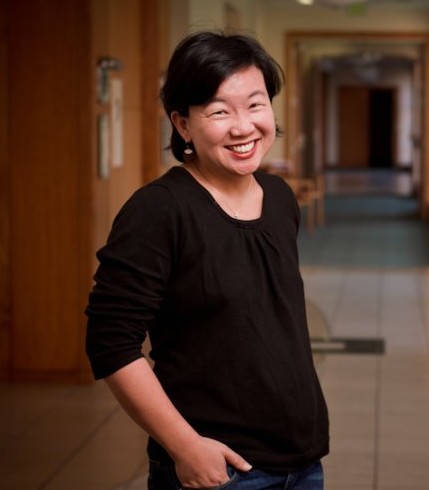 College Crumbling and Seeking God
College Crumbling and Seeking God
My neatly ordered world crumbled when I got to college—like for many others. In addition to trying to find a new set of friends, making my way far from home, and navigating the thrill of having lots of people “like me”, I was shocked to find that my college experience upended my neatly ordered faith. Before, my Christian faith was tucked into a manageable box. I tried not to swear at tennis meets and to make good choices. But then I encountered a community of people who tried to be like Jesus. They studied scripture, took it seriously and let scripture inform the major decisions of their life. Being in this extraordinary community transformed my high school faith into an adult faith. And I became curious about what the world would look like if the promises that God made in the Bible were reliable and true.
So that began a journey of both seeking after God, and calling others to follow Him with their whole lives. I did this for years, with young adults on campuses with InterVarsity Christian Fellowship in northern California. But who was the teacher and who was the student? From Stanford students, I learned what it was like to merge faith with an intense leadership environment. From Berkeley students, I learned about a faith that was as big as the world, and God’s heart for those on the margins. And from University of San Francisco students, I learned about following God in the realities of a city, work, job, and other obligations.
God used my times on campus to challenge the small assumptions I had about what faith means, and how faith applied to life. My easy answers didn’t go over well with the student that was navigating a family member through incarceration. My heart broke, as I watch the past choices of a student catch up with her—just as she was beginning to show spiritual curiosity. And through these, I also had a chance to meet more extraordinary people who fed my imagination of a world transformed by God’s people being God’s people. I met communities of Christ-followers, who were making choices that were radical in their simplicity. These folks weren’t living to show off their devotion to God—they were saying simple yeses to each of God’s invitations to go deeper.
God’s Heart for Justice
During these years, Jesus invited me deep into two areas that continue to shape me today—justice and gender/race. Initially, I went to work at UC Berkeley, because I wanted to learn more about racial reconciliation—and the ministry on that campus was marked by excellence in that area. But while I was there, I began to learn about God’s heart for justice. Within the US context, this means engaging with the racial injustice. But globally, key justice issues may also lay along the lines of gender, social class, language, land. It was during a deep dive of a poverty immersion with the Global Urban Trek, that a calling to stand with, be present with those who live on the margins, became clear for me. It’s a calling that I bring with me in the various spheres of my life.
In addition, Jesus was awakening me to the gift of my gender and race. It was through working with many Asian Americans, across the country, in various ways, that I began to see God transforming my own heart. Having grown up in an environment that was 49% white, 49% black and attending a Japanese American church, my race always seemed like a liability to overcome—something that made me different from others. But during an intensive mentoring/leadership program called The Daniel Project, I was exposed to other Asian American women, and their stories in a way that was startling. Their stories were intense: normal and extraordinary, heart-wrenching and hopeful. But at the same time, they had the effect of minimizing my experiences in the best way possible. Things that I thought were just my own personal story, I began to see in an over-arching theme, pattern, and narrative. I began to see my story, as part of a larger story—that of Asian Americans in the US. I also began to see God’s long story embedded in the history of my community. And in this fueled a fire for me to pursue, with abandon, the life abundant Jesus describes, fully embodied in my race and gender. To discover all the amazing ways that God is communicating himself to me, through these gifts—so that I might point others to this.
God's story fueled my pursuit of the abundant life, fully embodied in my race & gender. Click To TweetThese pursuits of justice and of a fully-embodied faith have taken me on a journey from the campus ministry world in northern California, to work on the program for Urbana Missions Conference, Lausanne 2010, and finally now to my current work with International Justice Mission (IJM), where I head up the IJM Institute for Biblical Justice. IJM is a human rights organization of Christian lawyers, social workers, investigators, and educators who work to fight for the end of slavery. The Institute is an action-oriented theological think tank that consults internally while also making IJM’s learnings available for the broader church. More people are caught in slavery today than in 400 years of the trans-Atlantic slave trade combined. And the majority of those are in Asia.
A Global Church Rising Up
What excited me when I was working with students, I’m now seeing on a global level. I’m most energized when I see the amazing ways that God is working through the global church–the basics of the faith, re-imagined. One example, the Holy Spirit Sisters responded to a request to create a processing center for our IJM clients. These sisters, in their humble and creative way, turned a simple act of hospitality, into an extraordinary ministry. They are just the right people to welcome women leaving a traumatic situation. It is simple and yet what they are doing is profound, huge, and magnificent.
And it’s been exciting to see whole swaths of the church rising up. Seeing the expansion of faith from being solely in the realm of the personal and private—and seeing whole swaths of the church say yes to Jesus’ invitation to care about the things that are happening outside of the church, that he also cares about. It’s exciting to see the ways that church is being church, inside AND outside the walls of the church.
I’m also exhilarated seeing the global church, in all its diversity, embracing its gifts for the benefit of the whole. Experiencing worship through the lens of other cultures always expands my picture of who God and his family are. Sitting in Peru, at a global consultation, hearing about ways that communities in South America are bringing the Gospel to speak into the violence of their communities, bring me hope—and inform what my teams are doing.
Complexities and Gifts
The problems are complex. Seeing the receptivity to the insights and teaching of our global brothers and sisters has been fertilizer to the soil—bringing much needed nutrients. Seeing the church recognize that we’re part of a global body, and moving from a sending mentality to a mutuality one has been extraordinarily exciting.
My picture and understanding of God is so limited—limited by my experiences, my ability to comprehend, my perspective. It’s easy to have answers, when you’re far from the problem. But being attached draws us near. And the connection to the global family of God shatters the tiny box I’ve confined God to. The scriptures come alive in new ways, as my understanding of forgiveness is de-simplified by those who wrestle with these in ways that are extreme—for example by talking with survivors of the genocide in Rwanda.
Gender and ethnicity are gifts that help me understand God. Click To TweetAt the same time, for the benefit of the broader body of Christ, its important for me to know what the gifts that God has given me—gifts like my gender and my ethnicity— are not obstacles for me to overcome. But rather gifts that God has given me that help me to understand him. It takes a multiplicity of cultures to more fully reflect God—as we are all image-bearers.
